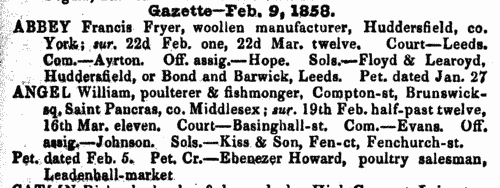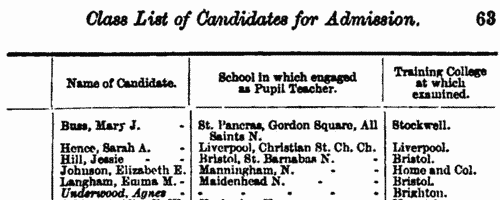Peeke Surname Ancestry ResultsOur indexes 1000-1999 include entries for the spelling 'peeke'. In the period you have requested, we have the following 63 records (displaying 41 to 50): Single Surname Subscription | | | Buying all 63 results of this search individually would cost £340.00. But you can have free access to all 63 records for a year, to view, to save and print, for £100. Save £240.00. More... |
These sample scans are from the original record. You will get scans of the full pages or articles where the surname you searched for has been found. Your web browser may prevent the sample windows from opening; in this case please change your browser settings to allow pop-up windows from this site. Traders and professionals in London
(1856)
The Post Office London Directory for 1856 includes this 'Commercial and Professional Directory', recording over 100,000 individuals. PEEKE. Cost: £4.00.  | Sample scan, click to enlarge

|  London Policemen
(1843-1857) London Policemen
(1843-1857)
The Metropolitan Police Register of Joiners (MEPO 4/334) lists policemen joining the force 1 January 1843 to 1 April 1857 (warrant numbers 19893 to 35804). The register is alphabetical, in so far as the recruits are listed chronologically grouped under first letter of surname. It gives Date of Appointment, Name, Number of Warrant, Cause of Removal from Force (resigned, dismissed, promoted or died), and Date of Removal. Although the register was closed for new entrants at the end of 1842, the details of removals were always recorded, some being twenty or more years later. Those recruits not formerly in the police, the army, or some government department, were required to provide (normally) at least two letters of recommendation from persons of standing, and details of these are entered on the facing pages: the names in these are indexed separately - this index refers only to the police constables. Where a recruit was only recently arrived in the metropolis, the names and addresses of the recommenders can be invaluable for tracing where he came from.PEEKE. Cost: £8.00.  | Sample scan, click to enlarge

| Bankrupts
(1857)
Bankruptcy notices for England and Wales: bankruptcy often caused people to restart their lives elsewhere, so these are an important source for lost links
PEEKE. Cost: £6.00.  | Sample scan, click to enlarge

| Bankrupts' Assignees
(1857)
Assignees of bankrupts' estates (usually principal creditors and/or close relatives of the bankrupt) in England and WalesPEEKE. Cost: £6.00.  | Sample scan, click to enlarge

| Bankrupts in England and Wales
(1858)
Perry's Bankrupt and Insolvent Gazette, issued monthly, included lists of bankruptcies and stages in the liquidation of the estate, payment of dividends, and discharge. The initial entry in this sequence gives the name of the bankrupt (surname first, in capitals), the date gazetted, address and trade (often with the phrase dlr. and ch., meaning dealer and chapman); the dates and times and courts of the official processes of surrender; the surname of the official commissioner (Com.); the surname of the official assignee; and the names and addresses of the solicitors; the date of the fiat; and whether on the bankrupt's own petition, or at the demand of petitioning creditors, whose names, trades and addresses are given. In subsequent entries the bankrupt is often merely referred to by name and trade. This is the index to the names of the bankrupts, from the issues from January to December 1858, which may or may not include the detailed first entry for any particular individual.PEEKE. Cost: £6.00.  | Sample scan, click to enlarge

| Boys entering Merchant Taylors' School in London
(1875)
Merchant Taylors' School was founded by members of the livery company of the merchant taylors of the city of London in 1561 as a grammar school. By the 19th century this was a major English public school. In 1875 the school removed from Suffolk Lane, in the City, to a new building in Charterhouse Square in Finsbury. In 1907 the Reverend William Baker, a former headmaster, published this school register for the period 1871 to 1900, which we have indexed by year of admission. Each entry gives the boy's name in full (surname, christian name(s)); date of birth; names of both parents (middle names as initials); occupation of father; career summary; and (in italics) address as of 1907.PEEKE. Cost: £6.00.  | Sample scan, click to enlarge

| Trainee Schoolmistresses in England and Wales
(1878)
The Education Department set examinations for candidates for admission into training colleges, and for the office of teacher. This is the list of successful female candidates from England and Wales at the examination at Midsummer 1878. The number in the first column shows order of merit in each class in the examination; then there is the name of the candidate (surname, christian name and any intermediate initial(s)), the school in which engaged, and the training college at which examined. The names of pupil teachers are shown in italics, with the 'school in which engaged' column left blank. These abbreviations are used in the names of schools: B., British; Bd., Board; Ch., Church of England; N., National; P., Parochial; R. C., Roman Catholic; U., Poor Law Union; W., Wesleyan Methodist.PEEKE. Cost: £6.00.  | Sample scan, click to enlarge

| Debtors, Insolvents and Bankrupts
(1880)
Bills of sale (binding assets to a creditor/lender), insolvencies and bankruptcies in England and Wales, July to September 1880PEEKE. Cost: £6.00.  | Sample scan, click to enlarge

| Money lenders and other creditors
(1880)
Bills of sale transferred title in all property of a debtor to a specified creditor. Possession of a bill of sale thus protected a money lender or other creditor from losing a debtor's property to other creditors (except landlords) in case of insolvency or bankruptcy; and in many cases signing a bill of sale was a required step for a borrower securing a loan. The bill of sale specified the amount thereby secured, but could be open, i. e., allow for further drawings on the same account. Entries from the official register of bills of sales in England and Wales were published in Flint & Co.'s London Manchester and Dublin Mercantile Gazette, a weekly publication available only by subscription, issued under the motto "Security in Crediting". The entries are listed by county, then alphabetically by debtor, surname first, with address, trade, the name of the creditor ('in whose favour'), dates of issue and filing, and amount. An &c. after the amount indicates an open bill. The creditors that appear in the 'in whose favour' column are mainly, but not exclusively, loan companies and individual money lenders, and Jewish names figure prominently among the latter. When a loan was paid off, satisfaction of the bill of sale was entered on the register, and these satisfactions are also recorded in these pages. 1 January to 31 March 1880.PEEKE. Cost: £6.00.  | Sample scan, click to enlarge

| Debtors, Insolvents and Bankrupts
(1881)
Bills of sale (binding assets to a creditor/lender), insolvencies and bankruptcies in England and Wales, October to December 1881PEEKE. Cost: £6.00.  | Sample scan, click to enlarge

|
Research your ancestry, family history, genealogy and one-name study by direct access to original records and archives indexed by surname.
|













